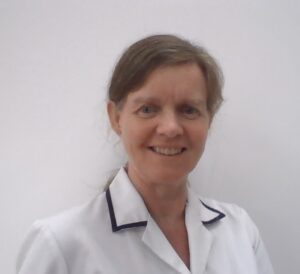- March 31, 2023

Belinda Twissell is one of the current cohort of Clinical Education Improvement Fellows (CEIF) for 2022/23.
Over a period of 12 months, Health Education England South East, Canterbury Christ Church University and the Florence Nightingale Foundation are supporting 10 professionals already working in the South East region who are completing this fellowship opportunity.
Here, Belinda tells us about her experience to date.
Belinda graduated as a physiotherapist from the University of the Witwatersrand (South Africa). A physiotherapy career opened doors to travel and work abroad and then settle in the UK. She worked at the National Spinal Injuries Unit at Stoke Mandeville hospital and then in a Rapid Response and Intermediate Care community-based team. Belinda is currently in a secondment post as a Practice Development Allied Health Professional for Buckinghamshire NHS Trust.

“Happy Spring to all our readers. As a person who grew up in the southern hemisphere, where the delineation between seasons is less obvious, the first sightings of snowdrops followed by daffodils and eventually the bluebells is something that I longingly anticipate each year.
The mornings were lighter, and crocuses were out in Cavendish Square for our March project supervision day. Professor Chris Burton arranged for us to meet in the beautiful wood panelled Sarah Swift room at the RCN London Headquarters. A novel venue for all of us but especially for those of us from the Allied Health Professions. We were made to feel most welcome.
Our learning activity that day was to present an implementation or intervention theory that we intend to use to frame our healthcare education improvement projects. These included Emotional Intelligence (Charlie), Transtheoretical Model of Change (George), Soft System Methodology (Helen), Self Efficacy (Beth), Logic Model (Felistas and Gemma) and Community of Practice (Angela and Belinda). We missed hearing from Pooja who is currently on annual leave.
My project aspiration includes facilitating a “Community of Practice” (CoP) to support the upskilling of colleagues working in interprofessional teams in a community healthcare setting providing an “Urgent Community Response” (UCR) service (Le May, A. 2009). A CoP is a social learning theory which recognises that individuals gain knowledge and skills, through their social and active participation in a shared area of interest (Lave, J. and Wenger, E. 1991).
As a cohort of Clinical Education Improvement Fellows (CEIF), we identified that we have all three of the essential components for a CoP (Wenger, E. 1998). This has been possible through the Florence Nightingale Foundation programme and Christchurch Canterbury University project supervision.
The table below identifies the essential components required for a CoP and how we as a CEIF cohort meet these components:
Essential components for a CoP | Clinical Education Improvement Fellows |
1. The Domain | Our shared area of interest is that we want to develop the leadership skills to be able to effectively implement healthcare education related improvement(s) within the context of our workplaces. |
2. The Community | Our shared activities have enabled us to build relationships and share information. These shared activities include:
Our identity as “Clinical Education Improvement Fellows” is forming. |
3. The Practice | We are developing a shared collection of resources for our practice. We are each starting to apply knowledge and skills from the FNF leadership development programme. These are having a direct impact on our individual capabilities to progress and implement our healthcare education improvement projects. Professor Chris Burton will be using meta-learning to support us to better understand our collective learning regarding the implementation of healthcare related improvements. Eventually our practice outputs will include our project outcomes; our identity as healthcare leaders; and a network of relationships to support our professional journey. |
In summary, our CEIF cohort is a “group of people who share a passion for something they do and learn how to do it better as they interact regularly” (Wenger-Trayner, E. and Wenger-Trayner, B. 2015).
Our FNF session this month was “Political Acumen” with Catherine Eden who was expertly able to guide us to the realisation that our leaders are more accessible than we might think. We now understand that we will be able to make progress with what we care passionately about; when we are able to connect with the right people, at the right time, and provide them with the right data.
There is a clear theme emerging across our leadership development sessions about the importance and value of quality relationship building.
We are immensely grateful to Health Education England South-East for funding our personal and professional development through this fellowship opportunity.”

References:
Lave, J. and Wenger, E. (1991) Situated learning: legitimate peripheral participation. Cambridge, United Kingdom: Cambridge University Press (Learning in doing: social, cognitive, and computational perspectives).
Le May, A. (2009) Communities of Practice in Health and Social Care. Chichester: John Wiley & Sons
Wenger, E. (1998) Communities of practice: learning, meaning, and identity. Cambridge, U.K.: Cambridge University Press (Learning in doing).
Wenger-Trayner, E. and Wenger-Trayner, B. (2015) An introduction to communities of practice: a brief overview of the concept and its uses. Available from authors at https://www.wenger-trayner.com/introduction-to-communities-of-practice. (Accessed: 13/03/2023).
If you would like to find out more about the 2022-2023 CEIF cohort, please click here. Also please do follow #SE_CEIF and #TeamFNF on socials to keep up-to-date.